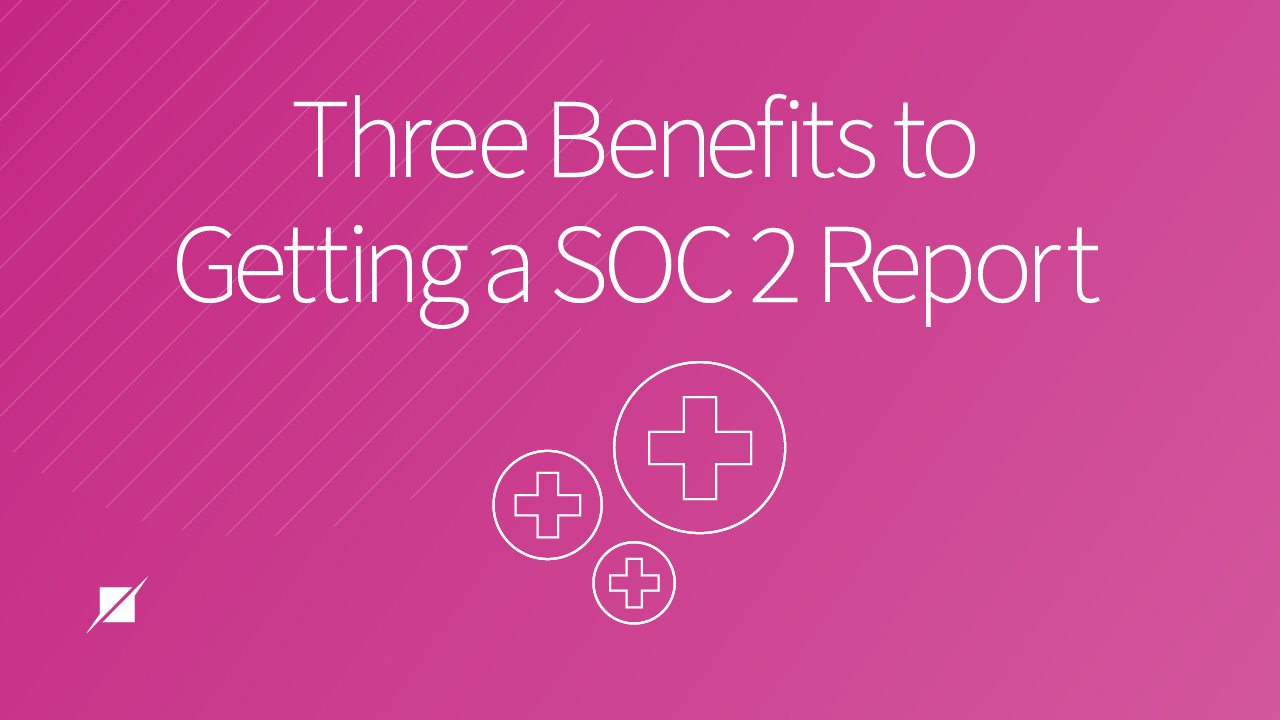3 Benefits of SOC 2 Reporting for Your Organization
Published: Dec 2, 2021
Last Updated: Jan 19, 2024
You know this story.
Your customers have come forward, asking you to provide validation of your internal security strategies and safeguards. They want to know that their data is safe with you, and they want a SOC 2 report as proof.
And that’s fine, you’re willing to do what it takes to ensure they feel confident in their partnership with you. The customer may always be right, but even still, the word “audit” doesn’t usually elicit any measure of a positive response.
So maybe you’re rubbing your temples a little bit just thinking about what this is going to take on your end. Just anticipating what it’ll cost, all the different things you still have to decide to make sure you honor your customers completely, even just learning what SOC 2 is, exactly—it’s no small undertaking.
It’s okay, we understand completely how complicated compliance is, having been on the other side of this audit table for almost two decades now, partnering with organizations to deliver reassurance to their own customers. But though we may be well-versed in how much goes into an optimal SOC 2 experience and result, we understand how it may not seem like your cup of tea.
Despite that, here’s something you should know: it may be a lot of work, but going through the rigor of a SOC 2 audit can actually mean more to you and your organization than just providing that assurance to your customers.
So let’s flip the switch and your perspective, because in fact, there’s a lot more to be gained that will be well worth the efforts you make. Here are three (more) reasons to put yourself through the SOC 2 process.
After reading, you’ll understand the lasting advantages you stand to gain both now and in the future should you ever undergo a SOC 2 audit.
1. It’s a difference maker for you in the market now, and in the increasingly competitive future.
You can always claim to be secure, but how about you prove it? Even if your customers aren’t already asking you for it, passing a SOC 2 audit is objective evidence that you’ve taken steps to prevent a data breach. Preventing data breaches turns into good credibility, which translates to a better brand reputation in your market.
Can all your competitors say the same? Maybe not, which means you’ll have the edge in winning new customer trust.
With so much moving online, increasing risk factors have consumers and individuals alike only looking to partner with vendors who are safe. Holding a SOC 2 report means you can market your adherence to the rigorous security requirements of a widely accepted standard while others cannot.
2. You’ll sleep better at night, and when you wake up, you’ll have the power to streamline internally.
Your customers will be more confident in you, and potential prospects will take a longer look at you. That’s all great. But the reassurance won’t just be for them—it’ll be for you too. Because let’s face it, you can read the standards, look inward and tell yourself you’re compliant all you want, but you might still have those little whispers in the back of your head wondering, “what if?”
Go through a SOC 2 audit process, and wonder no more because someone else will have double-checked your hard security work.
Speaking of hard security work, it’s about to get easier. We know—no audit is fun for the organization going through it, nor is it easy. But consider this, undergoing this process mandates the kind of labor that, in doing it, will provide you and your involved personnel a deeper understanding of your systems.
While working with your auditors, you’ll have to do your own deep dive into things like:
- Identifying your service commitments to your customers
- Your risk posture;
- Vendor management;
- Any relevant governance or regulatory oversight you are bound to; and of course,
- Your own internal controls in place.
Though a lot to parse through, it’ll all provide valuable insight that will enable you to improve your overall operational efficiency. With so much information in hand, you’ll be able to streamline your security processes and tailor any future or expanded controls based on your actual cybersecurity needs.
As far as secondary benefits go, those are both pretty good and their impact can be felt almost immediately. But what about the future?
3. With your compliance foundation laid, the possibilities are endless.
We’ve said before that SOC 2 is generally a very popular audit, and part of the reason is because it can also serve as a sort of gateway audit.
Maybe you’ve heard of ISO 27001, a certification whose appeal is also growing thanks to its more holistic approach to organizational security compliance and its international reach. But did you know that SOC 2 requirements are very similar to those of ISO 27001?
It’s important to recognize that a completed SOC 2 audit does not automatically get you an ISO 27001 certification, but think about this scenario: one day, in the future, a new client asks two of its vendors for said ISO certification.
- One company has never gone through any compliance process before and sets about laying the groundwork for their information security management system, which requires extensive perspective on their controls in place.
- The other company, having already gone through SOC 2, already has that extensive knowledge in hand, has a validated foundation in place for security, and can thus proceed apace through their setup for ISO 27001.
Which one would you rather be?
And it’s not just ISO 27001 that works well with SOC 2—the requirements also sync with other standards, frameworks, and security and privacy rules, including HIPAA, should your organization ever need that. You may not need compliance with any other regulatory standards now, but if it ever comes up, having gone through a SOC 2 will speed up and simplify those efforts when you need to make them.
Next Steps: Things to Know Going In
SOC 2 didn’t become a widely accepted, popular security audit just because she’s pretty—you know now that going through this audit can help your organization in a number of ways. Not only will you be better positioned in your market with a completed report in hand, you’ll rest easier in the present and be well equipped for your compliance future.
And now that you’ve learned why it’s worth it, you’re probably feeling better about making the requisite effort to commit to the process.
Don’t lose that momentum—channel it into what should be your next moves. If you’re doing this, you need to start understanding how to adapt the very flexible nature of SOC 2 to your needs. That means making lots of decisions, knowing things about your organization, and setting expectations so that you’re well-prepared going into that ultimate selection of a service auditor.
Schellman has done over 700 SOC 2 audits of varying types for all kinds of different service organizations in just the last year, all with clients that have varying degrees of experience with compliance or SOC 2, so we understand that you may fall anywhere on the spectrum of knowledge in this area. Depending on where you fall, here are an assortment of good launch points that we'll be adding to in the coming weeks:
- SOC 1 vs. SOC 2: Which is Best for You?
- Which Trust Services Categories Should I Include In My Next SOC 2 Report?
- What is the SOC 2 Process?
- What Does a SOC Audit Cost?
- How Long Does a SOC 2 Examination Take?
If you find you still have more questions, be they regarding the basics or the more particular sticky points of your organization, we at Schellman are happy to speak to you personally. We’ll help you clear up any uncertainties and ensure your process proceeds as smoothly as possible.
About JORDAN HICKS
Jordan Hicks is the Manager of Content at Schellman. As the owner of content marketing initiatives across all digital platforms and formats, she is responsible for the ideation of content, the authoring and development of the content, as well as developing and managing the editorial calendar to ensure the marketing goals are met as it relates to content.




